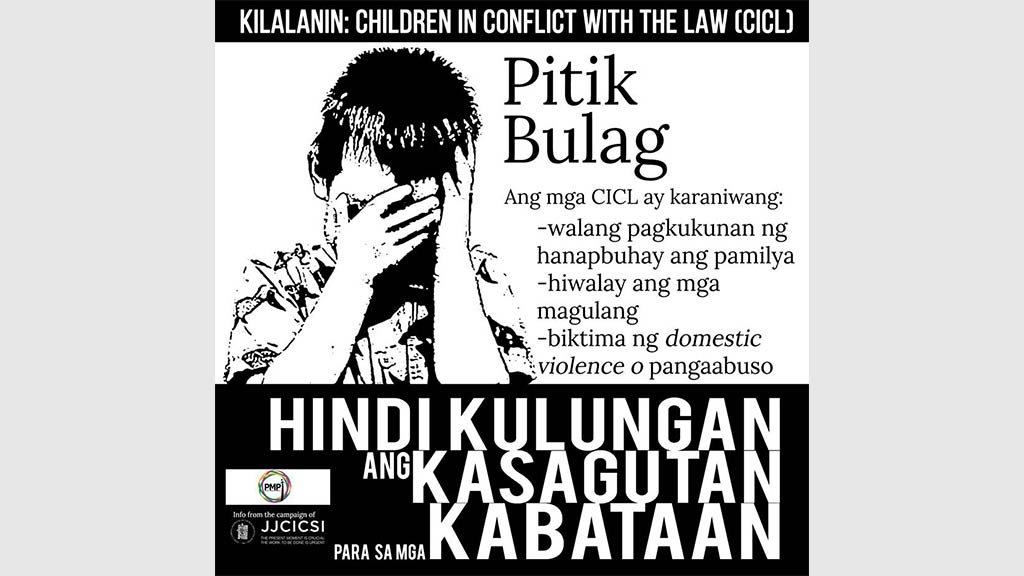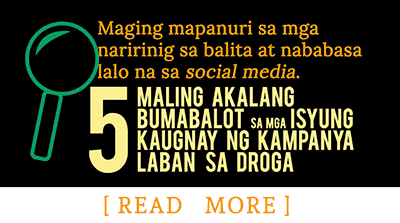Senate President Vicente “Tito” Sotto has recently filed a bill lowering the Minimum Age of Criminal Responsibility (MACR) in the Philippines from 15 years old to 12 years old. His Senate Bill No. 2026 is seeking to amend Sections 6, 20, 20-A, 20-B and 22 of Republic Act No. 9344 or also known as Juvenile Justice and Welfare Act (JJWA) of 2006. Similar bill was filed by Senator Franklin Drilon last year. Drilon’s Senate Bill No. 1603 also proposed the lowering of the MACR to 12 years old.
We, from the Philippine Misereor Partnership, Inc. (PMPI), a network of civil society organizations, rights groups, peace and faith-based institutions, are appalled that the Senate President himself, would push for a bill that will treat children as young as 12 years old as adult criminals. A supposed 6th grader who has yet to reach puberty; someone who has started growing his wisdom teeth, developing friendship and crushes; someone who is constantly being nagged by his mother for forgetting to fix his bed, to brush his teeth, and to take a bath because he’s glued to his gadget; someone who is so vulnerable that he wants independence yet very much in need of guidance of his parents and teachers can now be convicted as criminal.
PMPI firmly believes that these children are not the problem; our society is, our lawmakers are with their twisted concept and analysis of who are responsible and accountable of crimes committed by children.
The United Nations Convention on the Rights of the Child defines the child “a human being below the age of 18 years unless the laws of a particular country set the legal age for adulthood younger”. In general, children have fewer rights than adults; they have yet to develop their decision-making ability, thus, their constant need for guardians to make decisions in their best interest.
Being poor and having no power to make their own decisions, these children fall trap to criminal syndicates who force them commit crimes. Lowering the minimum age of criminal responsibility will not stop criminal syndicates from using children to get away from their crimes, it will only encourage them to use even younger ones to do the job, unless the government strengthen its mechanisms and policies to make criminal syndicates, who force children to commit crimes, are hold accountable.
Department of Social Welfare and Development (DSWD) Undersecretary for Protective Operations and Programs Group, Mae Fe Ancheta-Templa said that instead of pushing for the amendments of RA 9344, the focus should be on strengthening and support the implementation of JJWA across all social units since child justice programs require financial, logistical, and social service support.
The DSWD Undersecretary added that the PNP’s data from 2002 to 2015 percentage of offenses committed by children in the total number of crimes recorded is very much negligible, the percent distribution of crime committed by adult is higher at 98 percent, while those involving children is only 2 percent. Whereas in term of seriousness of crimes following Section 20A of RA 9344 as amended, 8 percent of crimes committed by children involved serious crimes while 92 percent were categorized as “non-serious.” [Source: https://news.mb.com.ph/2018/10/03/lowering-criminal-age-never-resulted-in-lower-crime-rates-says-dswd-usec/]
PMPI is not belittling crimes committed by a minor, but RA 9344 already provides guidelines on how to properly handle juvenile delinquency. Even if these children have committed petty crimes and/or heinous crimes, prison cells would be the most inhumane environment for them who will come in contact and possibly be influenced and trained by professional criminals.
While we cannot ignore the fact that there are also issues in transformational centers for juvenile delinquents, we still recognize that such institutions are mandated to provide holistic program with emphasis on basic education, spiritual formation, life skills, and livelihood skills to help children in conflict with the law develop into responsible citizens.
But more than that, the government should create an environment where every family is free from poverty and can live a dignified life, where children grow in a loving family, being cared for and accepted. To make this happen, the government should have a concrete plan to address the social welfare of poor families and prioritize the children’s education, nutrition, healthcare, and basic needs.
We are appealing to our honorable lawmakers to withdraw this any kind of proposed laws filed under the both houses of Congress, the government should instead focus on fully and effectively implement the RA 9344, we fully believe that such laws of this kind will mostly affect the underprivileged children of our society.

